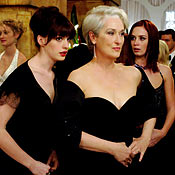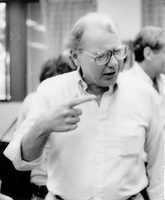
Or Foucault, or Jameson, or Hardt and Negri. Last night, Mr. Gordo and I went with the fabulous G-Girl, currently remaking her life, Mary Tyler Moore style, in BEC, to see that little confection of a film The Devil Wears Prada. It has been, as in all eastern seaboard cities, terribly hot here lately and the ultra A/C of the theatre was decidedly bracing, especially considering how sultry it was outside, even into the evening hours. I had heard of the book, knew it was a roman à clef about life at Vogue Magazine with the legendary editor Anna Wintour (known by her fans and detractors alike as Nuclear Wintour), and hadn’t been terribly interested in the film (pop fluff) until I read this intriguing review in the Times, which made me reconsider.
It actually is an interesting film, in many ways, if one can see beyond the mainstream shilling of tired clichés and honey-coated endings. Anna Hathaway, the Disney ingénue (of Princess Diaries fame, yuck) who plays the principled but clueless Andrea, assistant to Miranda (aka Nuclear Wintour, played comically and subtlety by Streep) is tiresome, and the film drags towards the end when it reaches for central casting stock resolutions to the complex questions of ambition, image, and success: Girl gets job, Girl makes good, Girl gives it up for integrity/love/self. To which all I have to say is, Girl please! But if one can see beyond such saccharine moralism, the film actually offers a compelling, if somewhat mainstream, disquisition on success, mentorship, and the micro-professional worlds we inhabit.

Andrea’s purported moral and ethical superiority is contrasted to Miranda’s cynical and manipulative nature, and the film unwinds along some very traditional lines of young Turks and Old Greeks. We are offered some nice montage sequences of Andrea’s transformation from Ivy League duckling to fashionista swan, without descending into the fashion victim outrageousness more common to Absolutely Fabulous. As noted in some of the reviews, the film makes an effort to distinguish the fashion world as an important and influential enterprise, not just frivolity (the ugly business of beauty, etc), but this message is a blunted by the fact that ever since the era of the Super Models our popular culture has been inundated by Fashion, Inc., so the mysteries of frivolity are worn a little thin here. Andrea loses herself to success, only to wake up and realise she’s on the verge of “losing what’s important” (which here seemingly is her annoyingly Seventeen-like boyfriend/chef, who looks like an extra from My Bodyguard).

But what’s wrong with success? The naïveté of the film’s narrative is one of the reasons that, arguably, American popular culture remains infantile and generally incapable of complexity. But complexity is to be found buried under the narrative, in Streep’s fascinating portrayal of Nuclear Wintour, a woman who knows how to maintain her position as ruthless Queen of the Fashionistas. Differing from the book upon which the film is based, Streep blunts Nuclear Wintour’s edges and turns her into something more than an empty paradigm of the worst boss ever. Miranda/Wintour sees in Andrea shades of herself, her ambition, her talent, and when she tells Andrea this, Andrea promptly gives it all up because she doesn’t want to end up like the monster Miranda/Wintour. The gendered elements of this particular lesson are especially disturbing. Tiresome, really.
For ambition and success mean making bad choices, making imperfect choices, and, above all, growing up and out of simplistic fantasies of moral and ethical superiority. As I watched this film, my mind turned to the question of how we learn what we learn, who mentors us into the arts of adulthood and career, and how we come to operate and survive in imperfect professional worlds. I have written on academic mentorship before, but the intriguing characterisation of Streep’s Miranda/Wintour made me think of the academic monsters we have lived under and learned something from, both good and bad. The professional economy the film presents is in some ways remarkably similar to academia, in its ruthless struggle to the top, competition at all levels, and the need to transform oneself from duckling to swan (although if only academics could look as fetching as the fashionistas, it would be a better world).

Miranda is all the intemperate PoMo academic stars come to life, of which I could offer an incomplete and indiscrete list, more paradigmatically than literally: Judith Butler, Fredric Jameson, Gayatri Spivak, Paul de Man, Jacques Derrida, Homi Bhabha, Slavoj Zizek. At one time, they all were on the top of the heap (in some quarters they still are), and deservedly so, for they were talented in the same ways Miranda/Wintour is: ambitious, unsentimental, principled, devotees to a higher cause, practitioners of faith (fashion, theory, all the same here, for one must believe). And all with accompanying stories of Miranda/Wintour like star turns and tantrums. To be a graduate student under them (or any of the other equal or lesser stars), so I've heard, was both torture and education in the most fundamental sense. The academic version of Miranda/Wintour tossing her fabulous coat and bag onto Andrea’s desk every morning has its academic equivalents in the hoops we must endure to maintain our acolyte status under the stars, and the academic stars are as infantile and immature as Miranda/Wintour is initially portrayed. In the most basic sense, the film reflects the standard hierarchy present in both the corporate and academic worlds. Eat shit, and bide your time for the rewards to follow. As Miranda/Wintour tells Andrea at the moment that Andrea decides to make her break, “Everyone wants to be us!” And sometimes this feels the same way in academia. Who wouldn’t want to be the acolyte of the star, eventually the star him or herself? The little groups of academic star acolytes and theory heads in their black suits and private giggles in conference hallways can make one feel like Marcia Brady on the first day of high school.

But why, I wondered, was I so fascinated by Miranda/Wintour and not so much by the academic glitterati that she so resembled? Was it because academics are always badly dressed (although the true PoMo crowd could give the fashionistas a run for their money)? Or was it because the material rewards of the fashionistas seemed so much more attractive than mere ideas, than the talented regurgitation of theoretical complexities and nuance that now, in our post-theory world, seem as quaint and archaic as the ability to speak Sanskrit? Or was it because the fashion business, in its imperfect filmic reflection in popular culture, seems more vital than the world of theory, more crucial to the quotidian (as represented in Miranda/Wintour’s brilliant if overbearing little speech to Andrea on the complex financial and sartorial history of the colour of her sweater)? How come the film left me wanting to be Miranda/Wintour’s little go-fer girl, but the thought of doing the same for Butler et al left me feeling cold, if not actually repulsed?

The last thought is what is so contradictory about how we think of ourselves as academics. If my larger observation about academia is true, then the business of fashion and beauty are similar to the business of thought, and tutelage under the stars does have (sometimes) its material rewards (although if I had a penny for every complaint by a student of the stars about how they didn’t get any help securing jobs, fellowships, and the like, I could probably buy exactly one tube of Vichy Capital Soleil). But there are some star students, some outstanding pupils, who learn and become close to the stars, who indeed become their currency, circulating and profiting from their relationship with the stars, and are fierce defenders of the faith, partisans and scrappers who made our lives hellish in seminar rooms with their singular devotion to their theoretical truths, who we now amusedly listen to at the MLA, with their theoretical references and belief in the transformative and definitive power of the critical apparati. Revolted with myself, I wonder if I am really like Andrea here, refusing success for ethics? I would like to think not, for in point of fact we all fall into schools of thoughts, streams of identification, that identify and circumscribe us as much as any acolyte of the leading postmodern theorists. We just like to think we're not as trendy.

Andrea’s choices are presented in the context of a Hollywood moral play, with the crucial difference between this representation and life being that for most of us, the means and ends are not so neatly tied up at the end of the film that is our life. The reasons as to why some of us can become star acolytes and others of us, lesser beings (poorer and without the ear of grant committees) are both structural, in terms of who qualifies as acolyte material, and individual, in that some of us are incapable of the blind devotion (not to mention the tedious reading) required to attain that success. At the end of the nineties, as the curtain was drawing to a close on almost thirty years of increasing theoretical sophistication (matched proportionally by an increasing density of texts), my girlfriend La Connaire sighed at the lack of new theoretical initiatives, and declared without irony that we were all waiting on the next thing from France, for as he said at the time, “it can only come from France.” Such sentiments speak to the power of theory at a particular moment as well as sound hopelessly naïve.

Those of us who tired of waiting on France make little sense to the theoretical equivalents of the fashionistas. In fact, the debates within the profession on the role and place of theory arguably put us in an opposing camp. I have nothing against theory, per se, but I want it to work. I’m not interested in words solely on the page, they must inspire my mind on some greater level. Theory heads are rightly accused of turning intellectual practice into technocracy, but that is also a function of how theory has operated professionally in the North American academy in particular. This perspective runs the risk of being anti-intellectual, but in the cyclical world of academia (a pattern matched in the fashion world: what’s old is new again), I have returned to the text: novels, memoir, reportage, not just as a cipher for theory, but rather as useful in and of themselves. How old fashioned! I have tasted, although not lived completely, the world of the academic Miranda/Wintour star turn, and found it lacking. I could never get it together enough to rouse such enthusiasm. This doesn't make me a better or more true scholar, just maybe lazier, since I never wanted to work that hard (and still don't), or maybe abjection didn't hold such a fascination for me. I would be lying, however, if I denied there wasn't a moral quality to this stance, but I'm just not sure how to figure it against all I know about the profession.



8 comments:
For ambition and success mean making bad choices, making imperfect choices, and, above all, growing up and out of simplistic fantasies of moral and ethical superiority.
Amen.
I love this post in part because, while my advisor is/was not a theory-head, she bears an otherwise scary resemblance to Miranda Priestly as refracted through your academic lens. She said, once, to a group of early-stage graduate students (smiling the while), "well, you know that you can't be us." She also said, once, to me: "You're not a superstar." (Adding, as an afterthought, "No one in your entire class is, you know.") She even dresses quite well for an academic. But--in many ways she remains for me a positive model, make of that fact what you will.
Prancilla here, struglling to think of myself as a Canuck. Miss you!!! Anywho, 'zilla and I saw the Devil Wears Prada on Tuesday. Like you, we were looking for a way to escape the heat. Afterwards we had an interesting discussion about mentorship, mean bosses, ambition, getting ahead, and, as you pointed out, what we learn from those rogue crazies. At first 'zilla was adamant that the Miranda types were just bad. I, as always wearing gray, thought her character was more complex, and thought about what it takes to get to the top of one's profession. It's not handed to you, and undoubtedly, if you decide to make a go at getting to the top, you will change. There's too much sacrifice and craziness for you not to. I wonder, given the sacrifices, and inevitable changes that ambition can bring, are we scared of what we might become? Isn't that what drove Anne Hathaway to throw away her sidekick phone? Another thought, did the Ann Hathaway character know what she was getting into? Of course not!!! She got caught up in something bigger than her, and as a result was temporarily lost, then had to create some personal, emotional, professional stability. Again, isn't that why she threw away the sidekick? Can we liken this action to our friends and colleagues who decide to drop out of graduate school? I being at the crossroads in graduate school. One time, upon arriving at the big professional conference for my field of study, I was be totally overwhelmed by the all the attention my advisor was getting, while at the same time desiring to be one of the big name academics I was walking with. Soaking up a bit of the fame and recognition, felt good, especially after being shit on during various graduate student activities involving senior faculty. As Dorian Corey says in Paris is Burning, "You take the ffame, and you like it." I decided to stick it out in graduate, in part, because of that desire. I guess what I'm saying is like you, the film resonated with me, and left me appreciative of the personal growth one can experience in the process of becoming a professional. None of us is perfect. Given our personal goals, we're just making our way the best way we know how. Just some food for thought...
After reading your article, I wondered once again what it must be like to have a demanding mentor, someone who sees him- or herself in you--someone who regards your work as a reflection of themselves--someone who requires revision after revision and demands perfection, as well as adoration? Back in grad school I envied the acolytes. Someone had provided them with--yes--DIRECTION. (And guaranteed funding.)
I remember how Hathaway's character would excuse the fact that she was ignoring her boyfriend or taking something away from someone by claiming that she had NO CHOICE. It was not her fault. If she wanted to stay in the biz, which now defined her entire existence and sense of self, she had to do what Miranda wanted.
This brings me back to acolytes to the academic stars. Their mentors may have given them direction but they also gave them a sense of VOCATION. Being an academic was a calling--not a job. It was the be all and end all and required sacrifice.
At the risk of voicing an unpopular opinion, being an academic for me is---yes, I will say it--simply a job. I enjoy teaching and doing research, but being a professor also means that I get to read anything and everything I want--whether or not it is in my field. It means that I get to spend the summers with loved ones or devoting myself to a creative project that will not help me pad the C.V. I don't want to focus solely on my academic career. My academic career, for me, gives me a plethora of interests that have little to do with getting published or tenure. This is why I like my job.
I will never be an academic star because I don't have the kind of focus that stardom requires. I don't want it, either. It would make me feel impoverished because I like experiencing variety; I like meeting a number of obligations and taking on different long-term and short-term duties.
The only time in my life when I was consumed with a single purpose was when I was a teenager: ALL I wanted was to leave my working-class life. Looking back at that focused teenager I feel both admiration and pity. I succeeded. However, the way I see it, my reward is that I (hopefully) will never again need to be consumed by a single goal or focus again.
That said, I don't regard Meryl Streep's character as a monster. I regard her as someone who has become what she become because she has reached her goal. She hasn't done it for mere money, either. She truly believes in power of fashion. She has had a hand in shaping artists and fashion. She loves what she does and the power that comes with shaping the world that she loves. For some people, such a focus makes them feel alive. I am grateful that there are such people in the world.
As usual, a thought-provoking post, Oso!
It seems to me - as someone who forms quasi-acolytic relationships with theorists I care deeply about - that Anon 3 is onto something about the mode of relation that's established, an intensity around material, more than agreement on an agenda. Of course, it is structured by all the usual political dimensions (esp. class), but one not so much "chosen" for that, so much as pursued, with more or less attention to relationships outside that material. While I feel a little uncomfortable about some of the star bracketing going on (some *very* different "putting to use" going on among that list of names), I agree there is something in the analogy. However I also think, in the corporate setting, about the manager who commands obedience to the party line, and the manager who will surround themselves with "talent" with little regard for established structure - both are expressions of power, against the organic development of community, but with a different structure of inclusion/exclusion.
Thanks for sharing these thoughts and experiences, always a must-read for me!
In terms of what forms our opinions about career, I always imagined that working involved going to the office, drinking coffee, and laughing with your friends. At least, that’s what it seemed like from movies and t.v.
As for theory, I am in a discipline that still has some suspicion of theorists. For me, however, theory exists as a toolbox to help us reconsider the past. Taking theory as "truth" (as many trendy-want-to-be-po-mo-scholars do) violates the founding assumptions of po-mo stuff.
Whaddya mean, the devil READS Butler? I thought the devil WAS Butler! No doubt I got lost in all her circumlocutions.
Being an academic star is being a diva--I went to see this Devil movie at the time that one such diva was stepping on her graduate students and fellow colleagues-no remorse, little awareness, total power trip. I am an academic, but I have to say I'd rather call myself an activist, a writer, nothing, nobody some days when I see the games folks engage in. Why do we assume academics should play nice? because they talk a load of leftie rhetoric and they are so high-minded that they float over you-just high enough to shit on you?
I have a writing deadline that I am not meeting, so I am grouching, and of course, I should be writing in Word not on a blog.
glad I found this blog though.
peace out,
I found this blog entry because I came up with that title myself upon watching the movie and googled if anybody had used it before. Unfortunately, someone has. But for totally different reasons.
The scene in the movie that me think of "the devil reads Butler" is the one where Miranda explains to Andrea that she cannot escape fashion. She can choose not to CARE about fashion, to not pay attention to it. But that doesn't mean that she can escape fashion products. She only starts wearing them when everybody else has moved on.
It's the same with theories in the humanities. It's not that they are only some fancy academic fashions that you can choose to do without. You can only choose not to pay attention to them, but you will eventually pick them up peu a peu when whatever insights they have to offer slowly make their way into public discourse; without knowing where they come from. And until then, you will keep thinking about society, the arts, etc in theoretical terms that are just "out-dated".
There is no "natural state" of non-theoretical perception. You are always viewing society, literature, paintings etc. through a theoretical lens, that at some point in history a "theory-head" has conceived and published. And those for whom all the "post-"theories are too "fancy" or artificial don't choose to go without theory. That just unknowingly choose to go with older theories that are outdated because the societies in which they were conceived were significantly different from the society in which they live now.
(I'm writing this from a German perspective, but it should apply to the US also. Your society has also changed quite a bit since the 30s/40s/50s - and theory needs to keep up).
Post a Comment